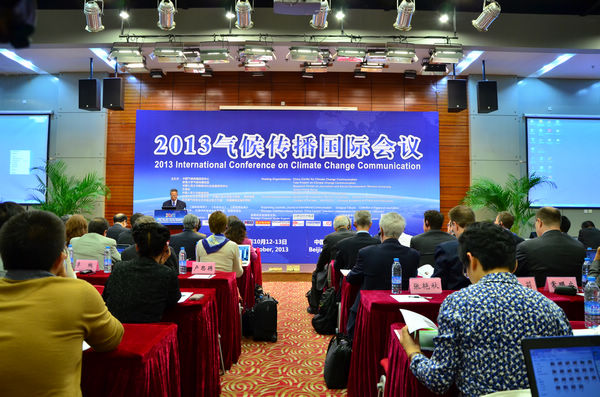Strict supervision crucial to curb air pollution
- By Gong Yingchun
 0 Comment(s)
0 Comment(s) Print
Print E-mail China.org.cn, October 15, 2013
E-mail China.org.cn, October 15, 2013
China has advanced its desulfurization and denitrification technology, but most enterprises are reluctant to use such innovative equipment due to the high costs involved. As a result, strict supervision from both the government and the environmental watchdog plays an important role in fighting air pollution, said Ma Zhong, dean and professor at the School of Environment and Natural Resources, Renmin University of China, during the 2013 International Conference on Climate Change on Friday.
|
|
|
The 2013 International Conference on Climate Change kicked off in Beijing on last Friday. [Gong Yingchun/China.org.cn] |
Last month, China announced its new five-year Airborne Pollution Prevention and Control Action Plan (2013-17), claiming that the nation will improve its air quality over the next five years. Concentration levels of PM2.5 particles in the Beijing-Tianjin-Hebei regional cluster must be cut by 25 percent by 2017, from the 2012 levels, which shows China's strong ambition to alleviate the nation's severe air pollution.
However, for over half of the past national day holiday, from Oct. 1 to Oct. 7, people in most parts of north China suffered severe smog, which once more aroused concerns over China's serious pollution problems and its pollution control efficiency.
"The most important task for China at present is to reduce its consumption of coal, Ma said. "China is highly dependent on coal, which accounts for almost 70 percent of its total energy consumption," he stressed. The massive coal consumption has become the main contributor of PM2.5 in China, according to a report released by Greenpeace in 2011.
Nevertheless, Ma went on to explain that the coal is actually not "born pollution." "We failed to take effective measures to curb the emissions that stem from the coal," he said. Coal consuming enterprises, the main emitter of PM2.5, are supposed to be responsible for the capital of applying the pollution treatment devices because that is their cost of production, Ma said.
Enterprises, however, are not restricted by compulsive regulations regarding the utilization of pollution control equipment. Consequently, the real dilemma lies not in what measures we take to prevent air pollution, but what policies we adopt to ensure those measures are effectively implemented, Ma continued.
Moreover, Ma also suggested that the government should lay down a series of long-term policies and measures to deal with the pollution problems. Beijing issued its new Clean Air Action Plan (2013-17) last month, claiming that the total number of vehicles in Beijing will be restricted to some 6 million by late 2017. It is estimated that the number of vehicles in the capital city will reach 5.44 million by the end of this year, which means that only 11,700 vehicles can be allocated every month under its existent license plate lottery policy, thus allowing fewer citizens in Beijing to own a private car.
Ma said the policy would be more acceptable if the government were to set a concrete limitation several years earlier and implement it over a longer period of time. The government should predict the situation and make its policies more reasonable, he advised.






